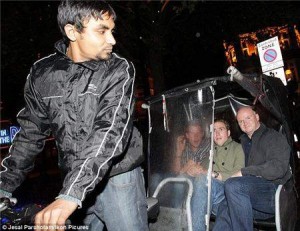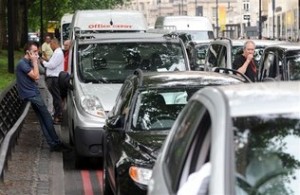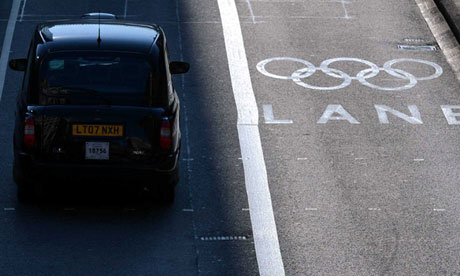by News Desk | Jul 30, 2012 | UK News
 India-style cycle rickshaws are often seen in upmarket areas such as Oxford Street and Regent Street, but their time may be soon up as Scotland Yard uses a 173-year-old law to arrest and fine drivers in central London during the Olympics.
India-style cycle rickshaws are often seen in upmarket areas such as Oxford Street and Regent Street, but their time may be soon up as Scotland Yard uses a 173-year-old law to arrest and fine drivers in central London during the Olympics.
The rickshaw is plied in areas of London, Brighton, Worcestershire, Leicester and Great Yarmouth in east England. They are popular with some commuters due to fares that are lower than taxis, but not everyone is happy.
Taxi drivers are unhappy at losing customers to rickshaws, while others believe the unregulated rickshaw drivers may pose a threat to public safety on roads.
Action has now been initiated against the rickshaw drivers under the Metropolitan Police Act of 1839.
In May, Labour MP John McDonnell tabled an ‘early day motion’ in parliament, calling for a ban on rickshaws during Olympics on the ground that they may obstruct emergency service.
Details released under the Freedom of Information Act to Daily Mail reveals that the Metropolitan Police stopped 534 rickshaw drivers in London in the three-month period between January and March.
Of them, 101 rickshaws were impounded and 53 drivers fined 80 pounds.
The 173-year-old law prevents anyone ‘riding or driving furiously such as to endanger the life or limb of any person’.
The police are cracking down on them as many motorists and pedestrians have reportedly been put in danger by reckless rickshaw drivers.
Chief Superintendent Simon Ovens, who is in charge of policing London’s West End, said: “I would like to see them taken off the road altogether. They put passengers at risk particularly passengers who have had too much to drink and the drivers are unqualified.”
The local council is also acting against the rickshaw drivers.
Councillor Ed Argar, Westminster City Council’s cabinet member for city management and transport, said: “Just a few pedicabs blocking the footway or road or travelling carelessly can have a huge effect on traffic congestion in the busiest part of London and put all road users’ lives in danger.”
During elections to the post of London mayor earlier this year, rickshaws were termed a ‘dangerous menace’, with candidates calling for a law to remove them from West End.
by News Desk | Jul 28, 2012 | London News
 LONDON (Reuters) – Disgruntled London taxi drivers snarled up traffic at one of the city’s busiest traffic hotspots as the minutes ticked down to the Olympics opening ceremony on Friday.
LONDON (Reuters) – Disgruntled London taxi drivers snarled up traffic at one of the city’s busiest traffic hotspots as the minutes ticked down to the Olympics opening ceremony on Friday.
Traffic came to a virtual standstill at Hyde Park corner as “cabbies”, furious at being barred from the Olympic-only traffic lanes on London’s roads, formed a slow-moving convoy around the junction.
Frustrated by the sight of free-flowing Olympic lanes while they sit in jams, the taxi drivers formed up for their go-slow at 2 p.m. after police had earlier told them they were not allowed to protest at the original time of 5 p.m.
According to a BBC traffic report, the vehicles were “stationary” for more than 30 minutes before police cleared the blockage without any reported incidents.
Drivers of the capital’s iconic black taxis are angry to be largely barred from the fast lanes set up to transport athletes, officials and sponsors in a fleet of buses and Olympic-branded BMWs.
Some say they have experienced a 50 percent drop in income since the lanes went into force on Wednesday.
A United Cabbies Group protest around the Houses of Parliament last week brought traffic in the area to a standstill, and on Monday, one driver dived into the River Thames off the historic Tower Bridge.
While police have allowed the protests, they have imposed the condition that none are to start after 4 p.m. local time.
“The Metropolitan police took the decision based on concerns that, if the protest were to go ahead in the time and location specified by the group, it would cause serious disruption to the life of the community,” a police statement said.
A United Cabbies Group spokesman said the Olympic lanes, nicknamed “Zil lanes” after the limousines used by senior officials in the old Soviet Union, undermined the idea of an environmentally friendly Games.
“When most of the athletes are in the Olympic Village out in Stratford, why did they have to impose lanes on central London?” he said. “There are terrible queues building up on the approach roads to London, with cars belching out fumes. The only way this Games will be green is if they hand out pots of green paint.”
Taxi driver Mark Wilcocks from Woodford Green, east of the City, said he may as well have gone on holiday.
“We don’t feel welcome at the Olympics,” he said.
“The Olympics hasn’t embraced the London cabbies. We feel nudged out by VIPs and corporate sponsors.
“They even used the symbol of the black taxi as an image of London in the build-up but we feel unwanted.”
He added that every London taxi is wheelchair-accessible but Paralympians arriving next month might not be able to make use of them if the lanes remain in place.
Unauthorised drivers face a 130-pound fine for driving in an Olympic lane. (Reporting by Martyn Herman; Editing by Sonya Hepinstall)
by News Desk | Jul 28, 2012 | London News
BBC Two is looking for a Taxi Driver to take part in the latest programme of the award-winning current affairs documentary series: Toughest place to be… a Taxi Driver!
The Toughest Place to be… series takes British workers to do their jobs in some of the most challenging places in the world. Previous programmes have seen a fisherman cast off to Sierra Leone, a bus driver swapping his double-decker for a Jeepney in the Philippines and a paramedic dealing with the aftermath of gang fighting in Guatemala City.
For the latest series the team are looking for Taxi Drivers who are up for a challenge and would like to test themselves on the roads of a far-flung country. This is an exciting opportunity to experience a different culture and see what life is like for a cab driver on the other side of the world.
Previous participants in the series, such as binman Wilbur (pictured), have talked about how the experience has changed their lives. They have forged strong friendships with their host family and have gained a unique connection with a foreign country.
Josh, a London bus driver who took part in the second series of the show, said he felt like he found a brother when Filipino host Rogelio let him in to his life and entrusted him with driving his precious Jeepney.
- For the latest series one adventurous cabbie will spend 10 days living and working in another country in September 2012. It’s a once in a lifetime chance to explore a new culture, it looks set to be a real challenge but it will no doubt be a rewarding and memorable experience.
If you are a black cab driver interested in finding out more about this challenge then get in contact with Rosie on 020 3614 0390. All calls are confidential and you will be under no obligation to take part.
For more info:
email: rosie.saunders@bbc.co.uk
or call: 020 3614 0390 or 07583 054 515
or have a look at past programmes on the BBC website: http://www.bbc.co.uk/programmes/b00z08wd
by News Desk | Jul 28, 2012 | London News
LONDON — London taxi drivers mounted a third protest on Friday over their exclusion from road lanes dedicated to Olympic traffic, with just hours to go before the games’ opening ceremony.
Traffic snarled in central London once the protest got under way at London’s Hyde Park corner at 2 p.m. (1300 GMT; 9 a.m. EDT). The demonstration had been slated for 5 p.m., but cabbies moved up the time after police put restrictions on their demonstration.
 The Olympics opening ceremony is expected to start at 9 p.m. London time.
The Olympics opening ceremony is expected to start at 9 p.m. London time.
The drivers of London’s iconic black cabs are miffed that they are not allowed into the “Games Lanes” reserved for Olympic athletes, officials and VIPs. Cabbies have held two other demonstrations on previous days, including one that jammed traffic at Parliament square.
by News Desk | Jul 28, 2012 | London News
 Taxi drivers say they should be able to use Olympic lanes reserved for athletes and officials.
Taxi drivers say they should be able to use Olympic lanes reserved for athletes and officials.
London taxi drivers have brought forward a protest over a ban on using Olympic traffic lanes after police imposed restrictions on the demonstration.
The drivers were due to start their protest at Hyde Park Corner at 5pm, a few hours before the official opening of the Games, but it will now be held at 2pm.
The cabbies have already held two demonstrations, including one which brought traffic to a halt outside the Houses of Parliament.
They argue that they should be able to use the lanes, which are available only to Olympic officials and athletes.
Scotland Yard said it had imposed conditions on the demonstration under section 12 of the Public Order Act 1986.
“The Metropolitan police took the decision based on concerns that, if the protest were to go ahead in the time and location specified by the group, it would cause serious disruption to the life of the community,” said a statement.
“The conditions imposed state that the protest must not start after 1600 on 27 July nor recommence until 0400 on 28 July on any part of the Olympic route network. During the time period specified all participants must remain south of the river Thames, must remain in their vehicles and remain moving unless they become stationary by circumstances outside their control.
“Our position on protest is clear – people do have a right to demonstrate, which is an important part of our democracy; however, that right must be balanced against the rights of others.
“We will facilitate protest and take a proportionate approach at all times.”
 India-style cycle rickshaws are often seen in upmarket areas such as Oxford Street and Regent Street, but their time may be soon up as Scotland Yard uses a 173-year-old law to arrest and fine drivers in central London during the Olympics.
India-style cycle rickshaws are often seen in upmarket areas such as Oxford Street and Regent Street, but their time may be soon up as Scotland Yard uses a 173-year-old law to arrest and fine drivers in central London during the Olympics.









Recent Comments